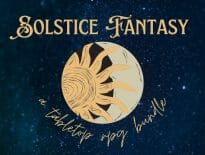So, some preamble: a while back, a friend of mine contacted me on social media and asked me to join a group chat on social media about DMing. It has been a good place for us to discuss ideas and rulings and has helped us keep our games fresh and steady.
![[AI Render] - gamers at tables](https://s3.eu-west-1.amazonaws.com/images.geeknative.com/wp-content/uploads/2022/11/27230600/Girdy_diverse_nerds_sitting_around_a_table_playing_dungeons_and_2eac34b3-43de-424f-a1cb-dd9c4f60a1a3.jpg)
Recently, I asked the group if there was anything I could write about, and I was asked to talk about inclusivity and diversity and RPG as therapy. After some thought and several drafts, I am going to give it a go.
Before I begin, I’d like to say that I’m writing from the position of a white cis male. While I may have faced some minor discrimination and hardship because I am a polyamorous pansexual with a sometimes-disabling condition, I feel that compared to most people in minority groups, I’ve been relatively privileged.
So when I talk about inclusivity, I can speak to how we might be able to get better, how we can improve our representation in games and can act as an ally to less privileged groups. But please don’t assume what I’m going to say is coming from the perspective of someone with a lived experience of being a minority.
That said, I do have some ideas as to how we can make our game worlds feel more inclusive. Please excuse a lot of ‘this is how I have done things’, but it helps to show how you can put the pieces in place to provide an environment where players can feel that they are seen.
Who are you playing with?
The first step towards making a table that feels inclusive is to get to know your crew of players, which depending on who you play with, you may know a lot or next to nothing about.
A real-world check-in about pronouns and subjects players don’t want discussed is one thing but also asking players about the ideas they want to interact with before you implement them is good practice.
I once ran a Cthulhu game set in the 50s, and one of my players wanted to play a young teen who was part of a lesbian subculture that was historically purposefully tomboy and non-conformist. I approached the player and asked if they wanted me to include the oppressive nature of the American 50s and the kind of discrimination women in that era faced if they stepped outside cultural norms. The player indicated that she’d had enough of that sort of thing in her real life and would prefer to enjoy the game and the character. So I wrote my content not to include prejudiced NPCs as antagonists or obstacles.

It’s important because sometimes you can feel like you are doing the right thing by including a historical injustice in your game rather than sweeping it under the carpet, but what you are actually doing is making someone re-live something they went through in real life when all they really want to do is chuck some dice with friends. So tread carefully and be aware of players. And while asking is always a good idea, please make it clear that the player is only being asked about their own preferences. No one likes to be pressured into speaking for or being an expert on a whole group of people. Don’t say, ‘how do you feel people might feel about that?’ instead, say ‘You are playing in this game, so I want to know where you are comfortable’.
Decoupling narratives, creating better cultures and representation
A cool part of building imaginary worlds is that we can allow representation to be freed of connotations associated with existing cultural mores.
In fantasy worlds, there’s no need to assume that people of any stripe have been held back by the oppression of the more powerful or that their culture mirrors Earth. And you can set this up.
For example, in my main campaign world, there was huge war thousands of years that pulled families and clans from all cultures of the world to one place, where in the aftermath, those peoples formed an empire. So thousands of years later, the capital is a thriving mix of different skin tones, builds and creeds. But all of these people have had a thousand years of being viewed as equal.
The reason I have done this is that I want people to be able to play characters that look like themselves without resorting to stereotypes – not every person with darker skin has to be from some desert empire. Those places exist, but it’s important that looking a certain way is not an indicator of cultural upbringing.
When we take this approach, it means that we can include representation in positive forward, thinking ways, not making the whole of an NPC’s identity the characteristic. You can have an elf shopkeeper casually mention his husband without it being the whole of his life. Maybe he also collects knives, is fastidiously tidy or likes Dwarven brass band music. Make sure that anyone you put in who is part of inclusivity isn’t built with the ‘box ticking’ mentality.
Allow the NPC to tell you who they are – case in point, a while back I had three Tabaxi in charge of a nomad band. When the players returned, it became more clear that the three were all in a marriage together, with the elder husband being the main caregiver for the children while the other two ran the band in a more hands-on way. They didn’t scream ‘LOOK AT US BEING POLYAMOROUS’ at the players, but it came up the second time when the chieftain mentioned that she trusted both her husbands.

We can create safe spaces for players who feel they want to explore identity or have as part of their fantasy a place where people treat them equally. Goliaths in my world don’t see gender as important and never distinguish, meaning there’s a place in which anyone who identifies as gender neutral wouldn’t have to put effort into explaining it. Part of feeling inclusive is modelling that acceptance in the stories you tell.
This can happen anywhere. I’m currently running a vampire game set in our world amongst the dark dealings of the sabbat faction. And normally, the Tzimisce clan are fleshcrafting horror machines. But as the players are majority LGBTQ+, I’ve looked into the lore and discovered a group known as ‘sacred band’ who are more concerned with trans rights, protecting New York from homophobic/transphobic oppression and using flesh crafting to help people become what they were supposed to be all along. They’re only horrid when pushed too far in the defence of the people they care about – and then beware. But each of them is also interested in their own agendas, like most vampires.
So when you’re planning a game, being aware of places you can include representation and moments of understanding that ‘other’ doesn’t mean ‘alien’ is crucial.
Inclusivity is about not just showing things outside hetronormative able-bodied western white culture but also making sure those identities are shown to be as valid as any other and are just as deep and real. That we understand that whatever our identity is, there’s common ground we can all find as people.
Next time, we are going to look at some things that might be difficult when dealing with inclusive content and how you can make mistakes even with the best of intentions.
🤖AI Disclosure. Software helped create images in this post. Geek Native's AI Content Policy.

